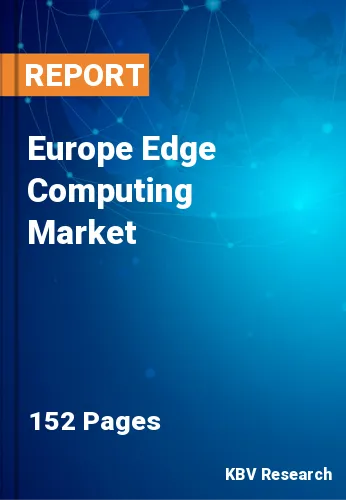
The Europe Edge Computing Market would witness market growth of 15.8% CAGR during the forecast period (2022-2028).
Edge computing enables users to fully utilize the massive amounts of untapped data that are generated by connected devices. One can find new business opportunities, improve operational effectiveness, and give consumers faster, more consistent experiences. By evaluating data locally, edge computing models can aid in performance acceleration. A thoughtful approach to edge computing can assist ensure privacy, keep workloads current in accordance with established standards, and comply with data residency laws & regulations.
By giving many of these systems access to a local source of data storage and processing edge computing hardware & services assist in resolving this issue. For instance, an edge gateway can process data coming from an edge device and only send the pertinent data back to the cloud. In the event that a real-time application requires it, it can also send data back to the edge device.
Edge computing may result in less expensive, faster, and more reliable services. Edge computing provides users with a quicker, more reliable experience. By avoiding bandwidth restrictions, reducing transmission delays, limiting service outages, and improving control over the transit of sensitive data, edge computing can lower network expenses. Reduced load times and the availability of online services close to users make both dynamic & static caching possible.
The UK Telecoms Innovation Network (UKTIN) will serve as a resource for telecom firms looking for funding, testing facilities, R&D collaboration opportunities, and new and enhanced technologies for UK mobile & broadband networks. The center, which will assist innovators at the ideal time to scale up, develop their products, gain better access to telecoms markets, and promote exports abroad, will be established and run by an organization that can apply for up to £10 million in funding through a competition the government has just launched.
The Germany market dominated the Europe Edge Computing Market by Country in 2021; thereby, achieving a market value of $7.1 billion by 2028. The UK market is exhibiting a CAGR of 14.8% during (2022 - 2028). Additionally, The France market would experience a CAGR of 16.7% during (2022 - 2028).
Based on Organization Size, the market is segmented into Large Enterprises and SMEs. Based on Application, the market is segmented into Smart Cities, Industrial Internet of Things (IIoT), Remote Monitoring, Content Delivery, Augmented Reality (AR) & Virtual Reality (VR), and Others. Based on Component, the market is segmented into Hardware, Software, and Services. Based on Vertical, the market is segmented into Manufacturing, Government & Defense, Retail & Consumer Goods, Healthcare & Life Sciences, Telecommunications, Transportation & Logistics, Media & Entertainment, Energy & Utilities, and Others. Based on countries, the market is segmented into Germany, UK, France, Russia, Spain, Italy, and Rest of Europe.
Free Valuable Insights: The Global Edge Computing Market will Hit $111.4 Billion by 2028, at a CAGR of 16.8%
The market research report covers the analysis of key stake holders of the market. Key companies profiled in the report include Cisco Systems, Inc., Hewlett Packard Enterprise, Huawei Technologies Co., Ltd., IBM Corporation, Dell Technologies, Inc., Nokia Corporation, Amazon Web Services, Inc., Intel Corporation, Google LLC and Microsoft Corporation.
By Organization Size
By Application
By Component
By Vertical
By Country
Our team of dedicated experts can provide you with attractive expansion opportunities for your business.
